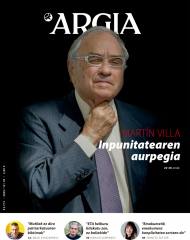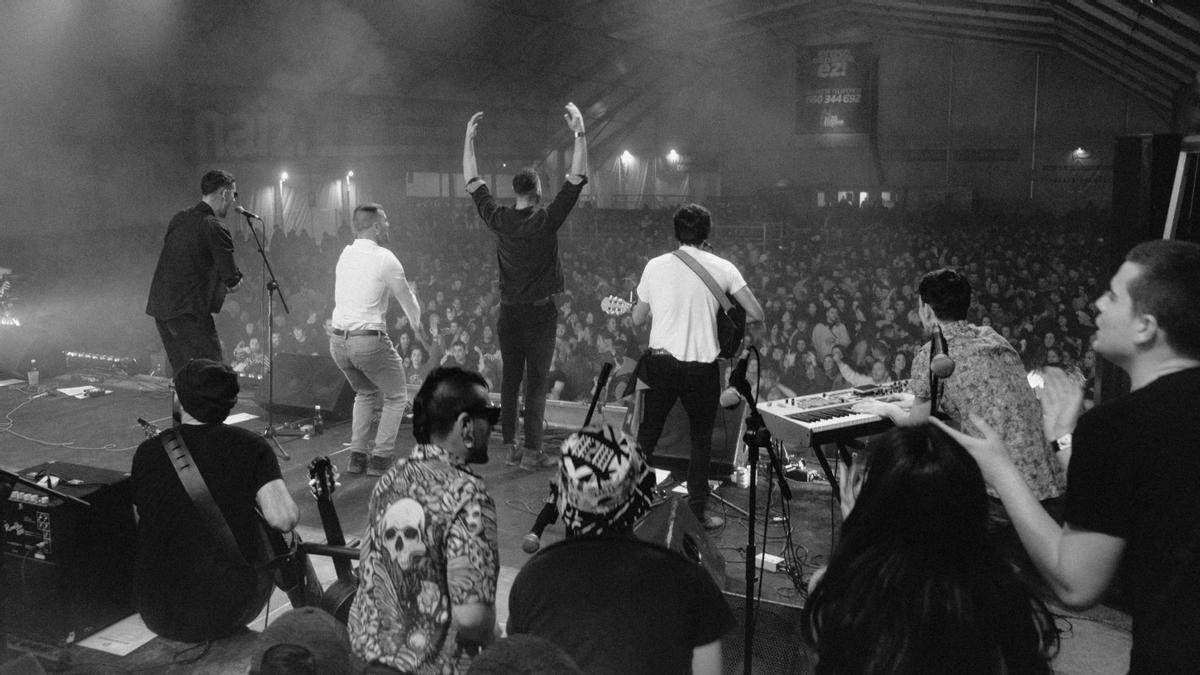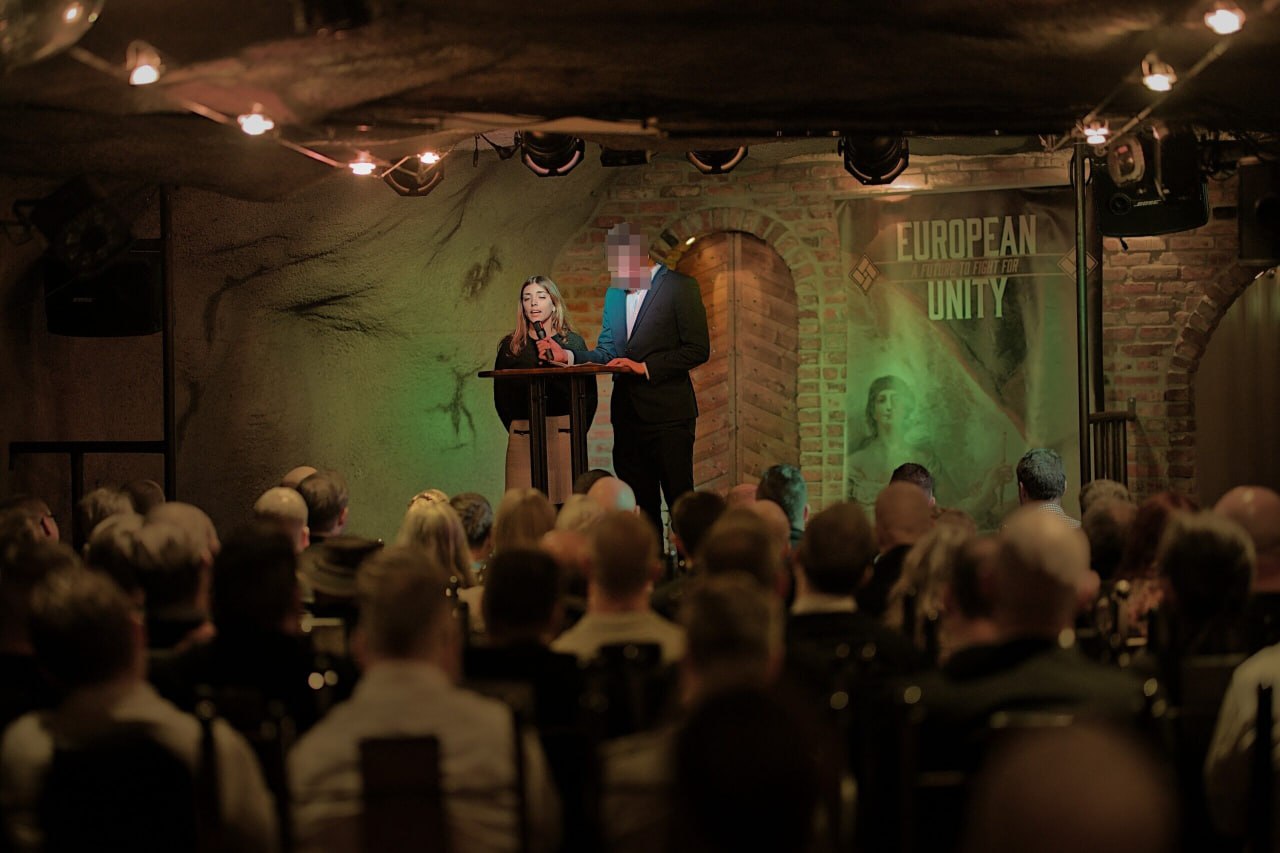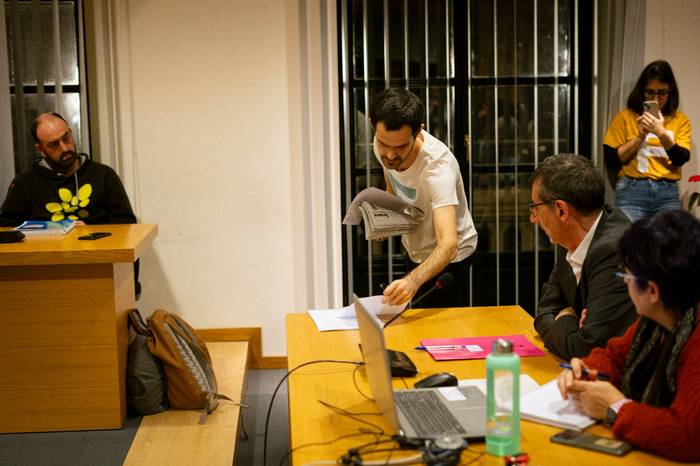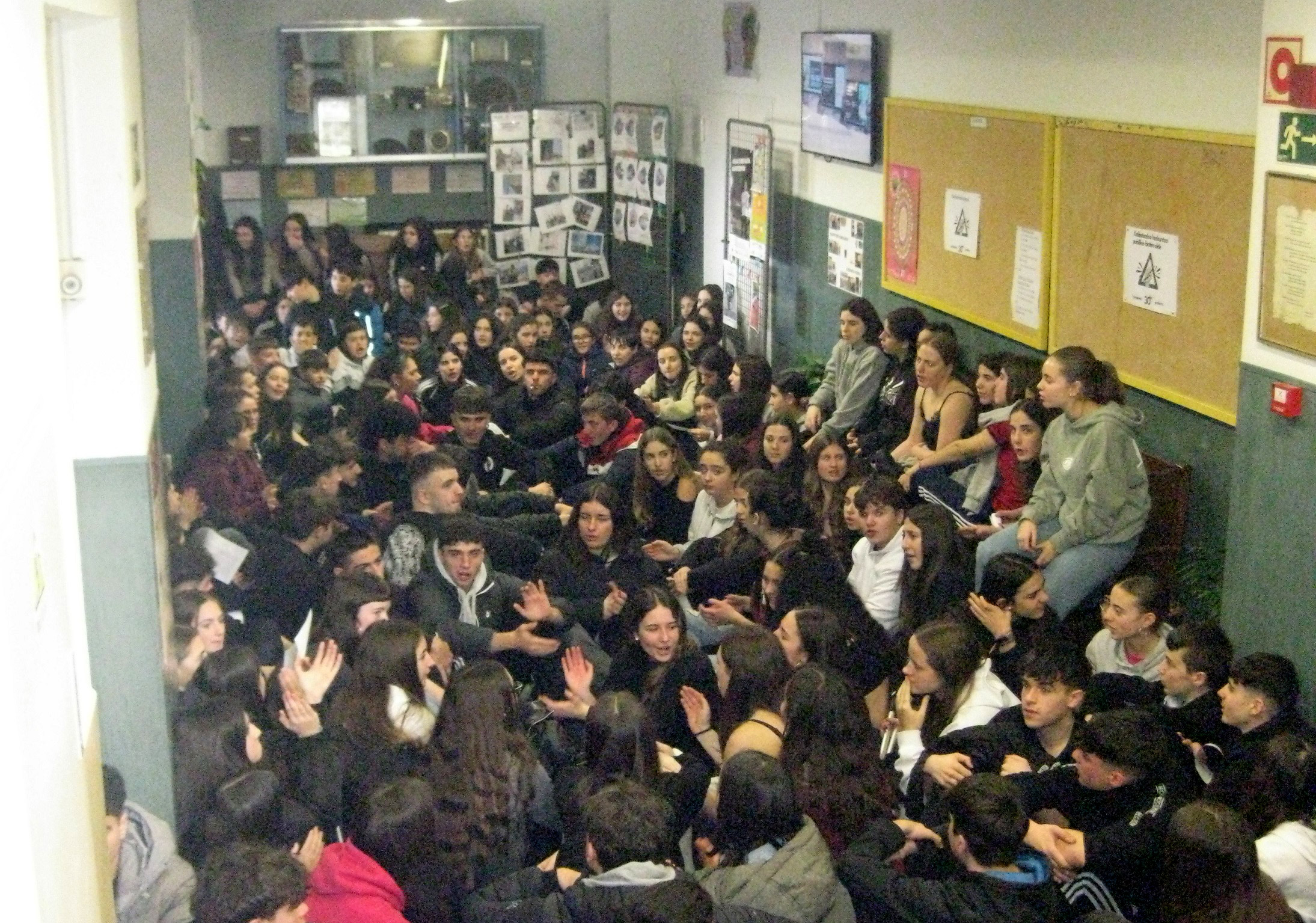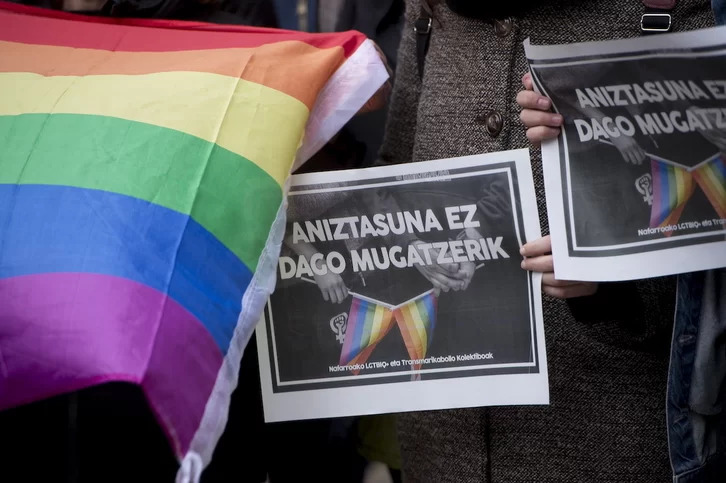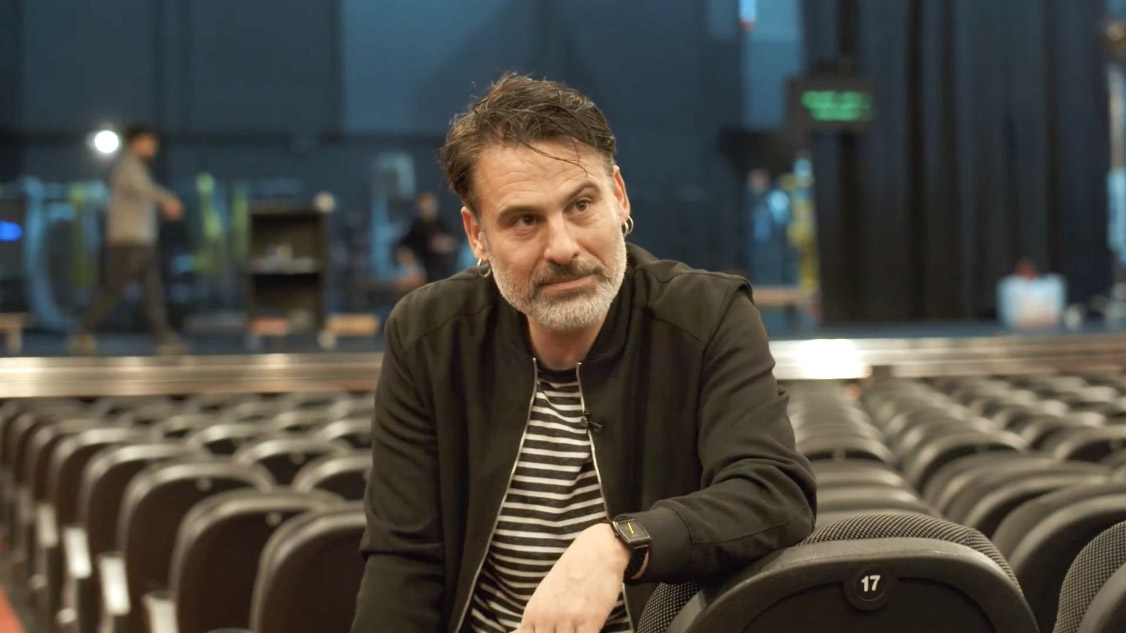"We were a lot of romantic ETA V.eko, Txomin lovers, not Artapalo lovers"
- The book of Funambulista Beldur (Erein) was written by Gorrindo (Gernika-Lumo, 1958) in which he testifies to his sixteen years of imprisonment (1980-1996). And it's not normal for them to write it that way among the ex-prisoners. Perhaps because he was expelled from ETA. Maybe because it's been a long time. Maybe because it is. It's a bitter story, more about conflict, as he says himself. In the words of Joseba Sarrionandia, one of the speakers of the word, “if we want the past cannot be understood, a story cannot be imposed, other visions must be heard”.
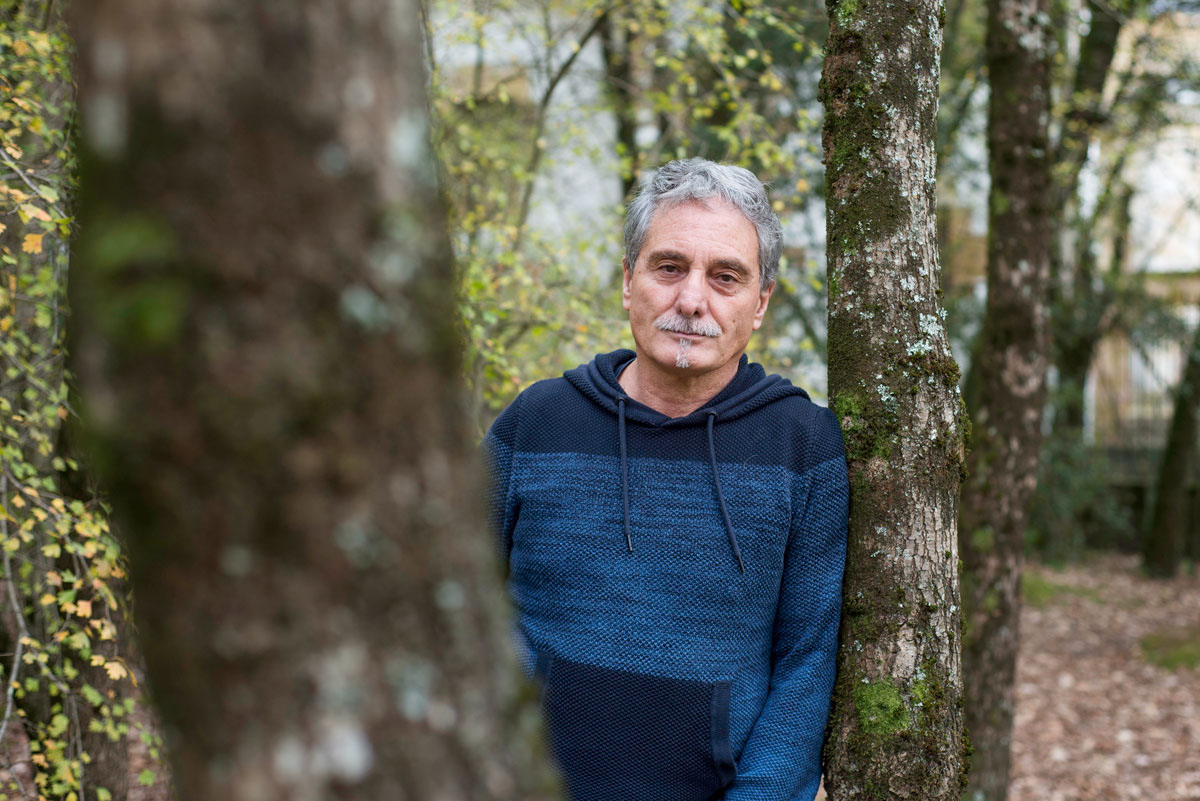
He left prison in 1996. Why does the book come 25 years later?
Because I wanted it now. But there are also other reasons: we live in another situation, the organization is not, it is about consolidating a single story from Spain… and in this context, I also wanted to make my own story. Why not tell things the way I lived them?
25 years ago I couldn't see myself able to write such a book. The way out of prison was quite traumatic – for me, for those at home and for friends – because we were expelled from the organisation. In the first half of the 1990s, our group of boycotts made public its disagreement with ETA’s strategy of ending the armed struggle and using other avenues to achieve our goals. This process also took place in Herri Batasuna, among the presentations by Oldaratz and Iratzar. They expelled us and took me only to Palencia prison. From there they brought me to Basauri and I left here to the street.
It is also a book written for years by the Abertzale left, for many valuable people marginalized, insulted and abandoned by ETA. We were told: “You are driven out, and if you speak, you know what you have.” We have been silent for 25 years, without hindrance, with “putasemes” for many in the town… it is also a book written for all of them. And, in general, for all those who lived those convulsive times.
Are the names of the prisoners you use all true?
Five, all true. Just in case I did so in the five, so that I do not harm them what I can say about them. In the event of a second edition, yours will also be true: Juan Lorenzo Lasa Txikierdi (Lauterdi), Iñaki De Juana (La Luna), Isidro Etxabe (Kublai), José Mari Sagardui Gatza (Mamia) and José Miguel Latasa Getaria (Lakasa).

Now you lived in peace, quiet. Hasn't this brought you any more problems? Those hard times, those names that are mentioned publicly, many raw moments… No, on the street
it has not brought me any problems, on the contrary, many have told me that the book is very good. But personally it has led me to very hard times. I entered ETA at the age of 17-18, driven more by emotion and love than by ideology, like most people. So I wanted an independent Euskal Herria Euskaldun and today as well. All of this we lived in a different way in prison, it was a development, and as a result we experienced harsh situations. I've come back to the harsh situations where I wrote the book, and it's sometimes been very painful for me. How much I cried writing the book! In his day I didn't take any notes and wrote the prison experiences with what I now think. How!
We're going to 1980. You were tortured, you were put in jail… In what mood did you get into jail?
I was proud and happy about myself, I was fighting for Euskal Herria, and I was willing to give life for him. Moving from the police station to Carabanchel was entering the sky. When I walked in, there would be about 300 people there, ETA m, PM… It was a warm welcome, but not knowing anything, of the future, of jail… it caused concern. However, there everything was a great crew, it was a great joy, a permissive jail… we organized our day to day, for example meals, the entrance and exit of the chabolas [from the cell] was quite free...
He remembered the circumstances. Soria, Puerto de Santa María, Herrera de la Mancha… says it is no better to talk about these places.
Soria was a real prison, much harder, and the Puerta prison, even harder. The latter was militaristic and we suffered a lot both physically and psychologically. In three years, we did three long hunger strikes. Psychological torture was great. Then they took us to Herrera, and if we left the port, it wasn't that hard. There, too, we had long fights, especially of communication – almost two years without leaving the prison – hunger strikes… and there were great clashes between prisoners. From the outside they told us that the hunger strikes had to be lengthened, some told us no, others that yes, “you are traitors”… among us we began to hit.
Until then, the tension came from jail, but the dispute that was held for
a moment onwards also brought a lot of tension, so you say in the libro.Para some the goal of ETA’s struggle was independence and Marxism, for others not. Some advocates of Marxism-Leninism later did not have this praxis in daily life… only ETA would achieve its objectives, the need to work with the PNV for independence, the road to sovereignty… we talked about everything between us. I and many others wanted independence, and then the people would decide what their form of government would look like. Then came the attack of Hipercor and many other actions, increasing our distribution, the kale borroka, the call for revolutionary taxes to more people… De Juana [Iñaki] once told him: “Your ETA and mine are not the same.” ETA became an objective and not a means of achieving the objective.
After all kinds of hard times, in a moment you say: “I will die in jail.” Did you really think about it?
Yes, absolutely. I had a conviction for many years, but then everything stayed in 30.Ademas, their friends died as well. Kirruli [Joseba Asensio], Krakas [Juan Carlos Alberdi]… In some of the Chapuzons I felt I was born in prison, which was part of it. When I was in Valencia, I went through my head to commit suicide: wake me up in the morning, look at the window and the bars above and… “no, no, no, I’m very cowardly for that.” But it occurred to me.
Time goes by, the differences are great, the clashes… and at a time when ETA kicks you out of the organization, with all that that means, out of the group of prisoners… You describe the moment when they communicated it to you as one of the hardest moments lived in jail.
Yes, because it was very unfair. Outside, on the Abertzale left there were great differences, there were several currents, several proposals. The same also happened in prison among the prisoners. We sent our analysis to ETA’s management, hoping it would go silently, but Latasa Getaria, who was a topo, gave the report to the director and the following day appeared in El Mundo. The world fell upon us. At the end of the day, we said that armed struggle had to be put aside and that work had to be done in other ways.
We did not seek our solution, we wanted to extend it to all collective reflection. By then, many had already left the collective and had worked their way, which was very respectable, but it was not our intention. We were still ETA, to the ground. Then we had not been expelled yet. We wrote another article to Euskaldunon Egunkaria, saying that we agree with the vision of Patxi Zabaleta, etc. And then we were kicked out. They told us that they expelled us “for not following the official line, for being unsupportive and for publishing our opinion”. They did not take us for traitors, but then it spread throughout the peoples of Euskal Herria.
They drove you out in Nanclares and sent you only to Palencia. Being there, ETA proposed that you become a member of the collective again.
When I was kicked out, I sent them a letter in defense of my dignity. I told them all and two. I received the proposal while I was in Palencia, on a visa with my family, and I was so angry that I did not answer. By then I had already served three-quarters of the sentence – for the customary prison benefits, studies, book writing… – and I thought I would ask for parole. In the group of prisoners you couldn't do that, it was forbidden, but I was kicked out and I decided to leave. To do so, I wanted to be with Iñaki Esnaola, who had already been expelled from the Abertzale left, but I didn't get it and I contacted Txema Montero for the exit. The lack of response blew the corporation and while I was on the street, the people of the apparatus told me several times: “If you know how to fix your situation, you have to go up.” To which I replied: “I owe no explanation to anyone, you did what you did to me and now, as before, I am enough to walk alone.”
Did you get out of the way that the Spanish Government has put? What conditions did you request?
No, I wasn't asked for anything. I signed the parole that was the right of every prisoner and ready. In a month and a half, I went twice to sign with the Ertzaintza and it's over. Subsequently, increasingly harsh measures were imposed to release prisoners on parole, and the conditions imposed on prisoners today would not be accepted by any person.

What did I think when he was called to repent in Gernika?
To me, personally, nobody has called me in Gernika. Nobody. Of course, I know that is said, it goes through the Eagle and... “that little boy what he does here?” Four years ago, I went to a EH Bildu rally, and one person said to a friend of mine: “What does that child do here?”
You say that the case of Yoyes in prison had a great impact on you, which was not understood... Have you ever been afraid of ETA?
No, never, especially, because when I was in jail, ETA asked me to rejoin the collective. But others were going and coming down the street.
The figure of lawyers is also mentioned in the book. What were they for you?
Since today, the political commissioners and ETA militants in recent years. In the 1980s, our lawyers were Iñaki Esnaola, Txema Montero, Iñigo Iruin and Kepa Landa. Then came the young people, to bridge, to learn and to shape ETA.
How do you see from today that he has been an ETA militant?
I have always been proud of ETA, until 1990 or something like that, but with posterity not. Also proud of Herri Batasuna, when in the 1980s he brought six Members out of the Spanish Congress, some of us cried with joy, convinced that this was the way and that the negotiation was going to come.
The book suggests that you entered ETA was idyllic, but by then there were lots of mess and tumult in ETA and many deaths.
Not idyllic, but romantic yes. However, I did not accept ETA's mytification, because myths are superior beings to people, and because we were no more than those outside because we were in jail. We were many of the romantics of ETA V., the lovers of Txomin [Iturbe], not of Artapalo. The latter expelled us from ETA, and ten years later ETA expelled him for the same reasons that he blamed us.
What would you now say to the victims of ETA? The victims you caused?
That to make politics, death is denigrating, inhumane, inhumane. I feel pain due to the pain caused, but sorry… no, those years have to necessarily contextualize to know what happened, to understand those times, to know why the ones that were made were done. The years after the transition and those of the 1980s were the years of utopia, a convulsive time in every sense: ETA, anti-militarists, environmentalists, feminists, antinuclear. We felt able to build a new society through ETA.
Left Abertzale is asked to make self-criticism, to say that “killing was wrong” -- I should say something else.
He has already confessed the damage he has done. What is more, it has now approved Spain’s budgets. What I don't understand is that I was betrayed as a traitor by asking for new paths and that they do so now. And, having said that, if that served to bring prisoners and exiles, or to take steps in our sovereignty, OK!
And there are still hundreds of people imprisoned or in exile. What does that tell you? Let the
Basque left abandon them without clemency, without asking for anything in return. Those who have given more have been badly treated. The pm, our natural enemies at that time, came out of jail with a lot more dignity.
Vagina Shadow(iko)
Group: The Mud Flowers.
The actors: Araitz Katarain, Janire Arrizabalaga and Izaro Bilbao.
Directed by: by Iraitz Lizarraga.
When: February 2nd.
In which: In the Usurbil Fire Room.









